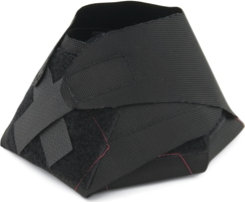Jerry M asked about how do you stop a horse from bucking when you are lunging him. "Hello, I am writing to see if you have any insight on my horse who almost always has to buck several times when I am lunging him. I lunge him at liberty to get him warmed up and to dimmish chances of him bucking with me in the saddle. A friend of mine told me that I can't let him get away with bucking because it'll carry over when I am riding him. If that's true, I don't see how I can stop him. It if matters, he is a 12 year gelding, I bought a few months ago when my trusted old horse passed away. Any help would be appreciated!"
There are some variables Jerry did not articulate such as how much this horse is being ridden, and if it's standing in a stall for days on end. I've seen 20 years old horses penned up for a few days and then taken to turn out just run, buck or kick out, what seems to me just for the fun of it or happiness to be free. I would also eliminate any potential problems such as being cinched up really tight, or a poor fitting saddle, or, anything else causing discomfort. When I free lunge a horse (what you call lunging at liberty), I don't worry too much about him bucking a few times, especially if he never does it with me in the saddle. Colts, especially when started, will often buck because of the unfamiliar weight on his back and the cinch around his barrel. For all we know horses may likely have this deeply ingrained instinct on something on their back similar to a Mountain Lion attacking. Anyway, colts will soon figure out it that it doesn't do them much good and they don't actually need to buck.
As far as stopping a lunging hose from bucking,...well, good luck with that. I don't think you need to try to stop it if he bucks one or twice then settles down. There is at least one widely recognized horsemanship clinician who says you can't let them buck, but I didn't see much success from him trying to shut it down. And besides a young horse bucking from that first saddling is frantic enough without someone chasing him around trying to get him turned or stopped from bucking. I think that is a colt bucks when lunging him after his first saddling, then settles down, he has learned that he doesn't have to panic and its a learning moment for them.
Interestingly enough, a handler not directly handling a horse can change a horse's behavior when they are doing something that you don't want them to do. I have a horse who started pawing the ground when tied to the trailer or hitching rail. After trying several things like pawing chains, I ended up changing that behavior by sitting in the shade, about 20 feet away, with a flag and whether he would lift a foot to paw I would flop that flag creating a noise that interrupted his beginning to paw. I must have flopped that flag 20 times or more the first day, and fewer times the second day. I don't know if he reconciled his pawing with a noise he didn't like, or I just changed his thought process just before he started to paw, but the resuts were the same, he stopped pawing.
I think turning his butt to you when changing direction, or kicking out at you are more egregious behavior, but I also think when I'm lunging him, it's his time to warm up and get relaxed. What I do when a horse turns butt first or kicks out, is first not to make it a federal offense, but instead change direction and make several fairy successive changes of direction. Sometimes on a horse turning his butt to you, you may have to get in his outside eye to get him to turn into you. A flag is handy for that.
Maybe one more thing. On yet a different horse, when I saddled him and warmed him up, he would be in a hurry and pretty tight for awhile. One day after I saddled him I just sat on my trailer step and petted on him for more than a few minutes saying (more for my benefit than his I reckoned at the time) and was talking to him saying "what's it going to take to get to calmed down sooner?" Anyway, then when I led him off and warmed him up he was a different horse right off the bat. This is a lesson I've learned several times (nobody has ever called me a quick learner) that giving the horse some peace and rubbing on him really pays off. But you can't fake it, you really have to have some feeling, some empathy for the horse. I hope I gave Jerry and maybe someone else something to think about.


















No comments:
Post a Comment